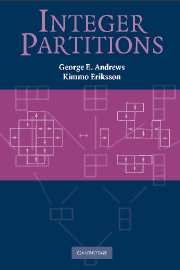Book contents
- Frontmatter
- Contents
- Preface
- 1 Introduction
- 2 Euler and beyond
- 3 Ferrers graphs
- 4 The Rogers-Ramanujan identities
- 5 Generating functions
- 6 Formulas for partition functions
- 7 Gaussian polynomials
- 8 Durfee squares
- 9 Euler refined
- 10 Plane partitions
- 11 Growing Ferrers boards
- 12 Musings
- A On the convergence of infinite series and products
- B References
- C Solutions and hints to selected exercises
- Index
9 - Euler refined
Published online by Cambridge University Press: 05 June 2012
- Frontmatter
- Contents
- Preface
- 1 Introduction
- 2 Euler and beyond
- 3 Ferrers graphs
- 4 The Rogers-Ramanujan identities
- 5 Generating functions
- 6 Formulas for partition functions
- 7 Gaussian polynomials
- 8 Durfee squares
- 9 Euler refined
- 10 Plane partitions
- 11 Growing Ferrers boards
- 12 Musings
- A On the convergence of infinite series and products
- B References
- C Solutions and hints to selected exercises
- Index
Summary
In Chapters 1 and 2, we examined in detail Euler's simple and elegant theorem:
The number of partitions of an integer n into distinct parts equals the number of partitions of n into odd parts.
As we have seen, this theorem foreshadows a number of further results, the Rogers-Ramanujan identities being the most celebrated. In this chapter, we shall delve deeper into Euler's theorem (2.1), presenting two combinatorial variations and concluding with a consideration of a very recent refinement.
Highlights of this chapter
Sylvester refined Euler's theorem by considering the number of odd parts, and the number of sequences of consecutive distinct parts, respectively.
Fine's refinement of Euler's theorem instead considers the largest of the odd parts and Dyson's rank of the partition into distinct parts.
Bousquet-Mélou and Eriksson's refinement considers odd parts of bounded size and so-called “lecture hall partitions” into distinct parts.
Sylvester's refinement of Euler
In the late nineteenth century, the colorful mathematician J. J. Sylvester (1884) first discovered that there is more to Euler's theorem than meets the eye. The theorem we now consider appears in a gigantic paper, entitled A Constructive Theory of Partitions in Three Acts, an Interact, and an Exodion.
Theorem 12 (Sylvester's refinement)The number of partitions of n using exactly k odd parts (each of which may be repeated) equals the number of partitions of n into k separate sequences of consecutive integers.
- Type
- Chapter
- Information
- Integer Partitions , pp. 88 - 98Publisher: Cambridge University PressPrint publication year: 2004



